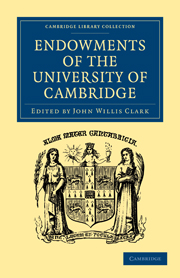Book contents
- Frontmatter
- PREFACE
- Contents
- I REAL ESTATE, TITHE, RENT-CHARGES
- II ROYAL GRANTS AND LETTERS, ACTS OF PARLIAMENT
- III FOUNDATIONS WITH MORE THAN ONE OBJECT
- IV PROFESSORSHIPS
- V LECTURESHIPS AND READERSHIPS
- VI SCHOLARSHIPS
- VII MEMORIAL STUDENTSHIPS AND MEMORIAL FUNDS
- VIII PRIZES
- IX EXHIBITIONS
- X UNIVERSITY BUILDINGS
- XI CHARITIES
- XII MISCELLANEA
- XIII FINANCE
- XIV APPENDIX
- XV CHRONOLOGICAL SUMMARY
- XVI INDEX
VI - SCHOLARSHIPS
Published online by Cambridge University Press: 07 September 2010
- Frontmatter
- PREFACE
- Contents
- I REAL ESTATE, TITHE, RENT-CHARGES
- II ROYAL GRANTS AND LETTERS, ACTS OF PARLIAMENT
- III FOUNDATIONS WITH MORE THAN ONE OBJECT
- IV PROFESSORSHIPS
- V LECTURESHIPS AND READERSHIPS
- VI SCHOLARSHIPS
- VII MEMORIAL STUDENTSHIPS AND MEMORIAL FUNDS
- VIII PRIZES
- IX EXHIBITIONS
- X UNIVERSITY BUILDINGS
- XI CHARITIES
- XII MISCELLANEA
- XIII FINANCE
- XIV APPENDIX
- XV CHRONOLOGICAL SUMMARY
- XVI INDEX
Summary
CRAVEN SCHOLARSHIPS, STUDENTSHIP, AND FUND. 1649.
The Scholarships.
John Craven, created Baron Craven of Ryton in Shropshire, 21 March, 1642–43, by Will dated 28 May, 1647 (A), founded and endowed four Scholarships, two at Oxford and two at Cambridge. The Scholars were each to receive an annual stipend of £25 for fourteen years out of the rents of an estate at Cancerne near Chichester, and the residue was to be employed in the redemption of English captives at Algiers or any other place under the dominion of the Turk. At Cambridge the first Scholars were elected 16 May, 1649.
The founder died in 1649, while his elder brother and heir, William Craven, afterwards created Earl Craven, was abroad. He, however, as he tells us in the deed of trust printed below, accepted the provisions of his brother's Will, and paid the Scholars through his agents, until his estates were confiscated by the Parliament, when the payments of necessity fell into arrear. After the Restoration, by deed dated 5 July, 1664 (B) he conveyed the land at Cancerne to trustees “for the better performance of the charitable uses” directed by his brother's Will, and for the payment of the arrears due.
Baron Craven's Will does not prescribe the mode of election of the Scholars, or the subjects in which they are to excel; in fact his principal object seems to have been to provide pecuniary help for poor students who deserved it, and for his own kinsfolk.
- Type
- Chapter
- Information
- Endowments of the University of Cambridge , pp. 281 - 344Publisher: Cambridge University PressPrint publication year: 2009First published in: 1904



